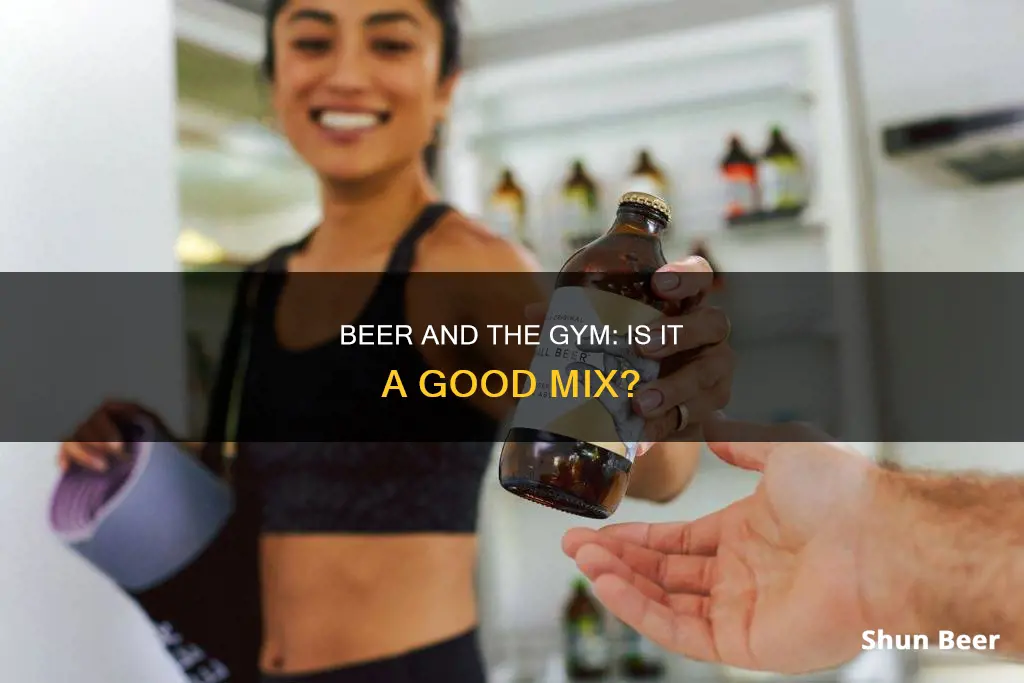
Drinking alcohol and exercising is generally not recommended. Alcohol affects your coordination, balance, and spatial awareness, and can make you more prone to injuries. It also inhibits your body's ability to use glucose effectively, affecting your energy levels and performance. Additionally, alcohol is a diuretic, which can lead to dehydration, further impacting your workout. However, some people share their experiences of working out after drinking a few beers, suggesting that it might be manageable as long as the alcohol consumption is minimal and one refrains from intense exercises.
| Characteristics | Values |
|---|---|
| Alcohol's effect on the body | Alcohol is a diuretic, causing dehydration. It also affects balance and coordination, and can cause an increase in heart rate. |
| Drinking and exercising | Drinking and exercising can cause impaired coordination, balance and judgement. It can also cause dehydration, and increase the risk of injury. |
| Drinking before or after exercise | Drinking immediately before or during a workout can cause dehydration, elevate your heart rate, and tire you out. |
| Drinking after a workout | Alcohol affects the body's ability to rehydrate and recover. It also reduces the body's ability to synthesise proteins, which are needed to rebuild torn muscles. |
| Drinking and athletic performance | Alcohol can negatively impact athletic performance, and can counteract the health benefits of exercise. |
| Drinking and muscle-building | Alcohol can lower rates of protein synthesis, which increases muscle size and aids muscle repair. |
| Drinking and glucose | Alcohol inhibits the body's ability to use glucose stores effectively, reducing energy levels. |
| Drinking and inflammation | Alcohol is an inflammatory, which can increase the risk of injury when combined with exercise. |
| Drinking and weight gain | Alcohol is a source of 'empty calories', which can lead to weight gain. |
What You'll Learn
- Drinking alcohol before a workout can increase the risk of injury
- Alcohol is a diuretic, which can lead to dehydration
- Drinking can negatively impact athletic performance
- Alcohol inhibits protein synthesis, reducing muscle repair and growth
- Drinking after a workout can affect your body's ability to rehydrate

Drinking alcohol before a workout can increase the risk of injury
Alcohol is a diuretic, which means it increases your need to urinate. Combined with the sweat produced during a workout, this can easily lead to dehydration. Dehydration and muscle fatigue are common results of drinking alcohol, and there are also more serious risks, such as heart arrhythmias, which are more likely in cases of heavy binge drinking or chronic alcohol use.
Alcohol is also a depressant, which means it slows you down. Your reaction time, strength, endurance, and aerobic capacity will all likely suffer, so your workout won't just be potentially dangerous—it will also be sub-optimal. The full effects of alcohol are not immediate, and you may not feel drunk until you're well into your workout, which can set you up for serious injury.
In addition to the immediate risks, drinking alcohol before a workout can also negatively impact your recovery. Alcohol slows the natural recovery process by elevating cortisol levels, decreasing testosterone levels, and inhibiting protein synthesis. This means your body will take longer to repair the small tears in your muscles caused by exercise, leaving you sore for longer.
Beer and Chest Pain: Is It Safe to Drink?
You may want to see also

Alcohol is a diuretic, which can lead to dehydration
Alcohol is a diuretic, which means it promotes water loss through urine. When you drink alcohol, you're not just bringing on a buzz; you're kicking off a series of physiological changes. Once you swallow the alcohol, it gets absorbed in the small intestine and travels throughout your bloodstream, affecting the major parts of your brain, protein synthesis, hormones, and more.
Alcohol inhibits the production of a hormone called vasopressin, which plays a large role in the regulation of water excretion. Vasopressin tells your kidneys to reabsorb water rather than flush it out through the bladder if it is needed by the body. With the body's natural signal switched off, the bladder is free to fill up with urine, which is then excreted when we go to the toilet.
The consequence is that we lose more liquid through our pee than we take in. That’s why we need to go to the toilet more often when we drink alcohol and also why we’re at danger of becoming dehydrated unless we replace the excess lost fluid by drinking more water. Dehydration and muscle fatigue are the most common results of a big night out.
The only way to avoid the diuretic effect of alcohol is not to drink any at all. So, to avoid having to pee so frequently, limit the amount of alcohol you drink. And to avoid becoming dehydrated, make sure you replace lost fluids with water.
Do LCBO Gift Cards Work at Beer Store?
You may want to see also

Drinking can negatively impact athletic performance
Additionally, alcohol affects the body's ability to absorb and utilize nutrients, which is crucial for athletic performance. It inhibits protein synthesis, which is essential for muscle growth and repair. Alcohol also interferes with glycogen storage and utilization, impacting endurance performance as glycogen is a crucial fuel source for muscles during exercise. Furthermore, alcohol disrupts sleep quality, which is essential for athletic recovery. The combination of these factors can lead to a prolonged recovery period and a decreased ability to perform at the desired level.
Drinking can also cause dehydration, as alcohol is a diuretic that increases urine output. This, coupled with fluid loss through sweating during exercise, can easily lead to dehydration, further impairing performance and increasing the risk of injury.
The effects of alcohol on athletic performance vary depending on the quantity consumed, individual demographics, and the type of exercise performed. However, it is generally agreed that alcohol negatively impacts performance and that athletes should avoid ingestion before or during exercise. While moderate drinking may not have a significant impact, excessive consumption can lead to severe performance decrements. Therefore, athletes should prioritize effective dietary strategies and adequate hydration over alcohol consumption to optimize their performance and recovery.
IBS and Beer: Is It Safe to Drink?
You may want to see also

Alcohol inhibits protein synthesis, reducing muscle repair and growth
Alcohol inhibits protein synthesis, which is key to muscle repair and growth. Once ingested, alcohol travels through the bloodstream, affecting the brain, protein synthesis, hormones, and more. A study by Parr et al. (2014) found that alcohol consumption reduced rates of myofibrillar protein synthesis following a bout of concurrent exercise, even when co-ingested with protein.
Protein synthesis is essential for muscle repair and growth, as it increases muscle size and aids muscle repair. John Hawley, head of the exercise and nutrition research group at Australian Catholic University, found that athletes who consumed alcohol after working out had lower rates of protein synthesis compared to athletes who did not. This resulted in reduced muscle repair and growth for those who drank alcohol.
The amount of alcohol consumed also plays a role, with binge-level boozing having more detrimental effects. Additionally, the timing of alcohol consumption matters, as drinking during the post-workout recovery window can negatively impact muscle growth and the body's anabolic response. Alcohol can suppress the anabolic response in skeletal muscle, impairing recovery and adaptation to training and performance.
While moderate alcohol consumption may not significantly impact muscle growth, excessive drinking can hinder muscle repair and growth by inhibiting protein synthesis.
Pouring Beer: Catfish Bait or Urban Myth?
You may want to see also

Drinking after a workout can affect your body's ability to rehydrate
The more you drink, the worse the effects. Research has shown that rehydration after sport is only delayed if you consume alcohol with an ABV that is greater than 4%. So, if you do want to drink after a workout, opt for a low-ABV beer.
It's also important to note that alcohol can interfere with protein synthesis, which is necessary for muscle recovery and growth. This can lead to increased muscle soreness and reduced muscle mass gains.
To avoid dehydration after drinking alcohol, it's recommended to wait at least an hour or two after your workout before consuming alcohol, and to drink plenty of water.
Keto Diet and Beer: Is It Possible to Enjoy Both?
You may want to see also
Frequently asked questions
It is not recommended to go to the gym after drinking beer, as it can lead to dehydration, impaired coordination, balance and judgment, and negative side effects on your heart.
Alcohol causes a series of physiological changes in your body, including an increase in urine production, which can lead to dehydration, especially after exercising. It also affects your liver function, balance, coordination, mood, and heart rate.
Drinking alcohol before working out can increase your risk of injury, as it impairs your coordination and judgment. It can also lead to dehydration, muscle fatigue, and heart arrhythmias. Additionally, alcohol slows down your reaction time, strength, endurance, and aerobic capacity, impacting your workout performance.
It is recommended to wait until you are fully sober before exercising. The effects of alcohol can vary depending on factors such as your sex, weight, and food intake. As a general guideline, a standard unit of alcohol is typically cleared from the body in one to two hours.
Yes, instead of drinking beer, you can opt for beverages with low or no alcohol content. Choosing a drink with an alcohol content of 2% or below may not cause dehydration when consumed after exercise. However, beverages with higher alcohol content, such as an average beer (around 4% to 5% alcohol), can promote fluid loss.







